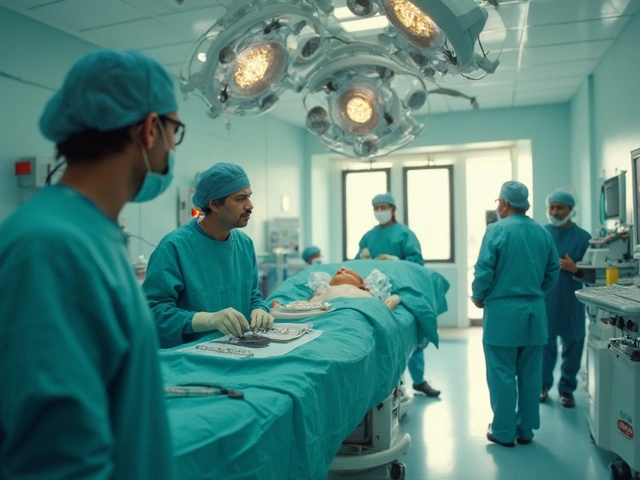- Home
- Cardiology
- How Heart Surgery Affects Your Brain: A Dive Into the Details

How Heart Surgery Affects Your Brain: A Dive Into the Details
So, you've been through heart surgery, and while your heart's on the mend, your brain might feel a bit off. It's not unusual to experience some cognitive changes after such a big procedure. You might wonder why your memory's a little fuzzy or why focusing seems harder than usual.
The link between your heart and brain goes beyond just blood flow. They talk to each other in ways most of us don't entirely get. After heart surgery, your brain might get a bit confused, leading to cognitive changes like problems with memory, focus, or even mood shifts.
Let's chat about a few things: what you might experience, why it happens, and most importantly, how to tackle it. Knowing what to expect can make dealing with these changes a whole lot easier. Trust me, with the right approach, you're not alone in bouncing back stronger.
- Understanding the Brain-Heart Connection
- Cognitive Changes Post-Surgery
- Emotional Well-being and Heart Surgery
- Practical Tips for Cognitive Recovery
- Supporting Your Emotional Health
- Navigating Long-term Effects
Understanding the Brain-Heart Connection
When we're talking about the heart and brain, we're digging into one of the body's most important partnerships. It's like an ongoing conversation where both are constantly checking in on each other. Now, this might all sound pretty abstract, so let's break it down.
Your heart pumps blood rich with oxygen and nutrients to your brain, and in return, your brain helps regulate heart functions through the autonomic nervous system. It's like a best friends duo where they each know what the other is doing. But what happens after a big procedure like a heart surgery? Well, things can get a bit mixed up.
During surgery, your body undergoes significant stress, impacting both physical and cognitive functions. The use of a heart-lung machine, which takes over the heart's duty of pumping blood, can sometimes lead to microemboli formations—tiny particles or air bubbles that may affect circulation to brain regions.
Research from hospitals has shown cases where between 30% and 80% of heart surgery patients experience some form of cognitive decline post-surgery. Yeah, that sounds like a wide range, but it depends on various factors like age and medical history. Sometimes it's just temporary, and other times, it sticks around a bit longer.
And it's not just physical changes. The stress of surgery can mess with your headspace too, making you feel anxious or even depressed, consequently impacting cognitive function. So, understanding this brain-heart interaction is crucial for navigating recovery.
For folks who went through surgery, being aware of these changes isn't just helpful, it's vital. Knowing what your brain might be going through can make a wild ride feel a little less bumpy, and help get you on track to recovery.
Cognitive Changes Post-Surgery
After heart surgery, you might notice that your brain isn't operating quite like it did before. This is pretty common and affects a good number of people. You might feel like your memory is playing tricks on you, or that your brain’s taking its time getting back up to speed. It can be frustrating, but understanding what's going on can really help.
One of the main reasons your brain may feel different is due to something called 'postoperative cognitive dysfunction' (POCD). It's like your brain's way of saying, "Hey! I just went through a lot, too!" This can lead to issues like reduced attention span, memory lapses, and even trouble with executive functions, like organizing thoughts or planning.
Want to know the nitty-gritty? During the surgery, fluctuations in blood flow or micro emboli can temporarily affect oxygen supply to the brain. Plus, anesthesia and medication can also have temporary effects on cognitive functions. While this sounds a bit worrying, many people notice improvement within a few weeks to months.
Here's a little tip: some folks find keeping their brain engaged helps speed up the process. Activities like puzzles, reading, or even chatting with friends can help retrain your brain. Consistent mental activity, combined with physical movement like walking, has shown to boost brain recovery. It's like giving your brain, as well as your heart, a workout.
All of these changes might feel daunting, but remember, your cognitive changes are often temporary. Keep a positive outlook, and with time, patience, and the right strategies, you’ll feel more like yourself again.
Emotional Well-being and Heart Surgery
When it comes to heart surgery, it’s not just the heart surgery recovery process that can be tough. Your emotions might go on a rollercoaster ride too. It's pretty common to feel anxious or even a little down after going through such a significant event.
The stress of heart surgery can lead to something called “postoperative depression.” It's when you feel blue or disinterested in things you used to enjoy. It's a real thing and not just something in your head. The combination of physical stress, medication effects, and changes in your daily routine can contribute to this.
Some folks might also experience anxiety, where even small things seem overwhelming. Simple routines could feel like climbing a mountain. Don’t worry, though, you're not losing it. It's normal after heart surgery.
Stay connected with friends and family. A strong support network can be incredibly comforting. Talk to them about how you’re feeling; you might be surprised by how much relief sharing can bring. If talking in person feels too much, a simple text or phone call works wonders.
Getting back to things you love, even in small doses, helps a ton. Whether it's watching your favorite show, reading, or even tossing a ball with your dog, Bruno, these activities can boost your mood.
If you're really struggling, it might be time to reach out for professional help. Therapists and counselors can offer great strategies to help navigate these feelings. Don't be shy to ask your doctor about what you're experiencing; they’ve heard it all before.
Remember, your emotional health is just as crucial as your physical recovery. Keeping an eye on how you feel and not dismissing these emotions as unimportant can help you recover more completely.

Practical Tips for Cognitive Recovery
Recovering from heart surgery isn't just about getting your physical strength back; it’s also about tuning up your brain. If you're feeling a bit foggy, here are some solid steps to help.
First off, give your brain some time. It's normal to face cognitive hiccups after surgery. Focus on simple activities to gradually get your brain back in action.
- Brain Exercises: Try puzzles or memory games. Apps like Lumosity can make this fun and help you regain focus.
- Daily Routine: Stick to a routine to give your day structure. Simple routines can help your brain know what to expect and reduce stress.
- Healthy Eating: Load up on foods that feed your brain. Omega-3-rich foods like fish, nuts, and seeds are your brain's best buddies here.
- Stay Hydrated: Keeping hydrated is super important for brain function. Dehydration can really mess with your head, even more so after surgery.
Getting plenty of sleep can work wonders too. Your brain does a lot of its repair work while you snooze, so it’s crucial to catch enough Zs. If sleep’s not your strong point, try relaxation techniques before bed. A warm shower, reading, or even some deep breathing might help you nod off.
Social interaction is another biggie. Chatting with friends, even over a cuppa, can boost brain function. It might just feel like fun, but you're also giving your brain a workout.
And lastly, don’t shy away from asking for help. Whether it's talking to a healthcare professional about your recovery plan or leaning on friends and family, support can make a huge difference.
Remember, you’re not just healing the heart—you’re working on getting back your mental clarity and focus too. Be patient with yourself, and in time, you’ll get there!
Supporting Your Emotional Health
Going through heart surgery isn't just a physical challenge. It can take a toll on your emotions too. It’s not uncommon for folks to feel a rollercoaster of emotions afterward, like anxiety, mood swings, or even depression. But don't sweat it—there are ways to get your emotional mojo back.
First up, staying connected with friends and family is key. Surround yourself with cheerleaders who can offer emotional support. Whether it's grabbing a cup of tea with a buddy or having a heart-to-heart chat with family, these connections can work wonders for your mood.
Engaging in activities that bring you joy can also boost your emotional well-being. Maybe it's picking up that guitar you haven't played in a while, exploring painting, or even starting a new hobby. Keeping your mind engaged with things you love helps distract from stress.
Let’s not forget professional help. Therapists and counselors are there for a reason. A few sessions might help you untangle the emotional ups and downs. They can provide tools to manage anxiety and teach techniques to cope with emotional shifts.
Meditation and yoga also come highly recommended. Breathing exercises can calm the mind, reduce stress, and improve focus. You don’t need to turn into a yogi overnight—just a few minutes a day can make a big difference.
- Stay socially connected—talk regularly with friends and family.
- Engage in activities that make you happy.
- Consider speaking with a therapist for guidance.
- Try meditation or yoga for calming stress relief.
Remember, healing after heart surgery is a journey, and part of that involves nurturing your emotional health. Taking the right steps can help you get back to feeling like yourself again.
Navigating Long-term Effects
After heart surgery, many folks experience immediate effects on the brain, but some changes can stick around for the long haul. It's not just an adjustment phase; these cognitive tweaks might hang out longer than you'd like. This is where understanding the long-term impact on your brain becomes essential.
One of the potential long-term effects of heart surgery on the brain includes what some people call 'post-surgery brain fog.' This could mean struggling with memory, attention, or even just processing information at your usual pace. Don't panic if things don't snap back instantly—your brain's working hard behind the scenes.
Research shows that a significant number of patients report cognitive issues even months after surgery. In fact, experts estimate that about 30% might experience such struggles. Yet, many find that these effects lessen over time as they adapt and recover.
So, what can you do about it? Let's talk strategies:
- Stay physically active: Light exercise, like walking or yoga, can boost blood flow, aiding both heart and brain recovery.
- Engage your mind: Puzzles, reading, or learning something new can keep your brain sharp and improve cognitive functions.
- Rest up: Adequate sleep is vital—it's the body's natural repair tool, especially crucial for brain health post-surgery.
- Monitor your diet: Nutrient-rich foods support brain recovery. Think omega-3 fatty acids, found in fish, flaxseeds, and walnuts.
If you're worried about persistent issues, chatting with a healthcare provider can provide insights and support. They might suggest cognitive therapy or other interventions to help ease the ride. Remember, adjusting to these changes is a journey, and every small step counts toward feeling more like yourself again.

Arnav Singh
I am a health expert with a focus on medicine-related topics in India. My work involves researching and writing articles that aim to inform and educate readers about health and wellness practices. I enjoy exploring the intersections of traditional and modern medicine and how they impact healthcare in the Indian context. Writing for various health magazines and platforms allows me to share my insights with a wider audience.
About
Medical Resource Center India is a comprehensive online platform dedicated to providing reliable health information and medical resources in India. Explore a wide range of articles, tips, and advice on medicine, healthcare services, and wellness. Stay informed about the latest developments in Indian medicine and access valuable insights into maintaining a healthy lifestyle. Discover expert guidance and health solutions tailored for every Indian citizen. Your go-to destination for authoritative medical knowledge in India.



